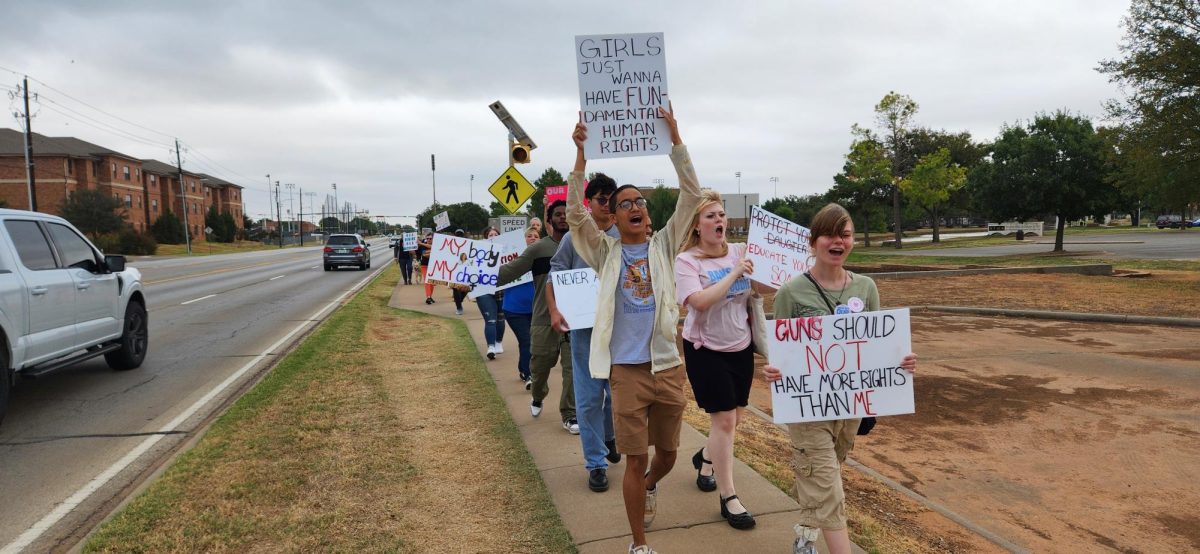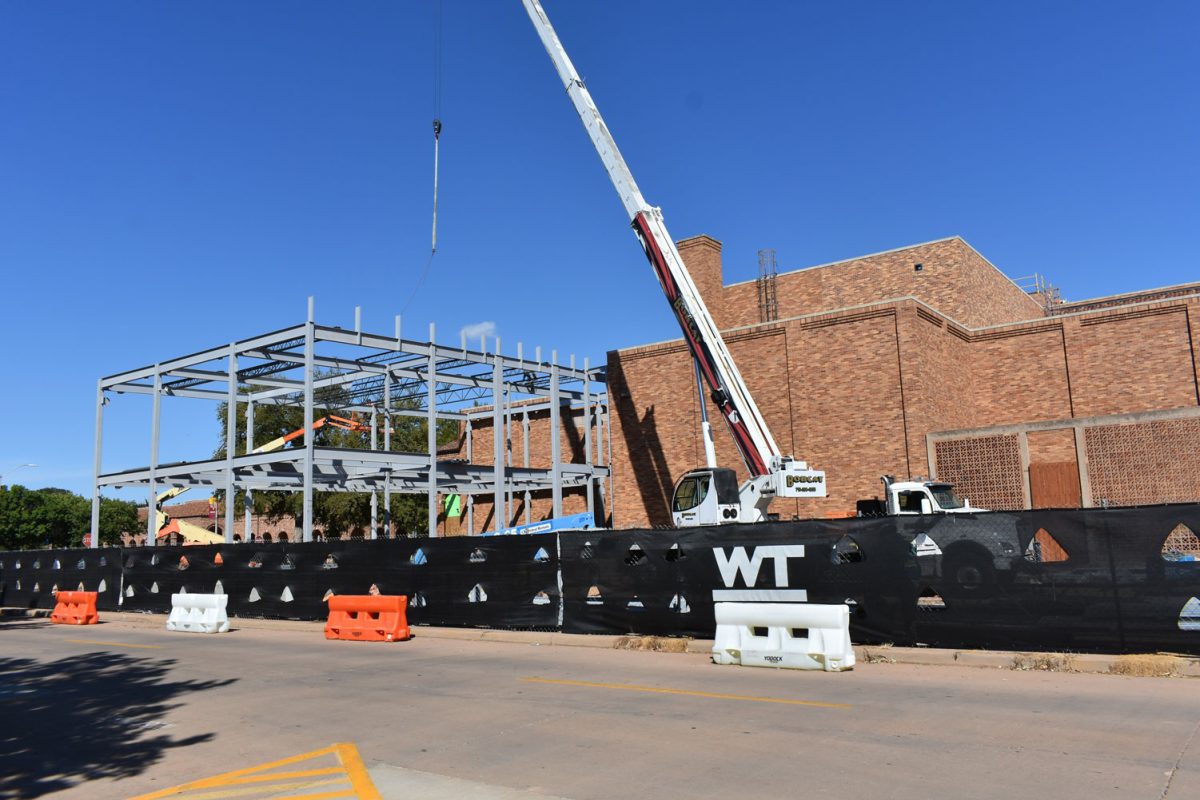Openly gay student turned away from donating blood
 Last Tuesday, a member of the Texas Blood Institute approached senior Daryl Smith to participate in a blood drive held on campus.
Last Tuesday, a member of the Texas Blood Institute approached senior Daryl Smith to participate in a blood drive held on campus.
After reading the blood donor education material, one question stopped Smith from saving a life.
“Do not donate if you are a male who has had sexual contact with another male, even once, since 1977,” it stated.
Smith said he confirmed to the nurse that he was a gay and was then told he was not qualified to give blood because of a policy made by the Food and Drug Administration.
Since Smith could not donate blood, he wrote a Letter to the Editor in the Feb. 6 issue of the Wichitan, which caused students and the community to take notice of this blood donation standard policy.
“Some people told me I should have lied about who I am just to donate blood,” he wrote in the Letter to the Editor. “I have spent far too long lying about my sexuality just to do it again for something that is supposed to be for a good cause.”
According to Smith, feelings of anger and sadness were the core reason why he submitted the letter.
“Knowing that I couldn’t give blood because I have slept with a man since 1977,” Smith said. “That’s really a whole generation of gay healthy men that can’t give blood. Every gay man deserves to be a hero.”
As long as gay males use safe practices, Smith admits this shouldn’t even be an issue.
“I honestly feel that there are so many healthy gay males who should have the right to donate,” he said. “What we do in the privacy of our home has nothing to do with the quality of our blood.”
Leslie Gamble, director of community relations for the Texas Blood Institute, said situations like Smith’s does come up from time to time.
“Our blood institute doesn’t take a position on this [topic],” she said. “We are bounded by the FDA regulations and guidelines. They inspect us and hold us to certain standards that we have to abide by. The Food and Drug Administration sets its policies that are based on medical data. They want to be sure that whoever is receiving the blood is the most protected possible in terms of giving safe blood.”
In 1983, the FDA introduced a ban on blood donations from men who had sex with other men since 1977.
Also, the current policy for human tissues is the deferral of men who have had sex with another man in the preceding five years due to the risk factor for HIV and Hepatitis B.
However, Gamble said the FDA has some conservative measures that are meant to protect the blood supply.
“If a person who cannot qualify to give blood for any reason whether it be living in another country or because they’ve had male to male sex, it becomes of questions of then not embarrassing a person because it goes be any of those things that our staff doesn’t point out to anyone or advertise why an individual wasn’t able to give,” Gamble said.
Gamble said the Texas Blood Institute’s main goal is saving as many lives as possible.
Although Smith said he understands the Texas Blood Institute has to follow certain guidelines, he said they should stand up against these views.
“If they just go along with the guidelines, which they know excludes a particular community from helping out someone in need, it really doesn’t send a good message out to everyone,” Smith said. “All it takes is someone saying, ‘Hey! This isn’t right and this needs to be changed.’”
Smith said this blood drive incident is not the first time he has been discriminated because of his sexuality, including being denied a job because he admitted to being gay.
“Just yesterday, I saw something posted that it was a choice that I was gay and I needed to check off being a Boy Scout leader and donating blood,” he said. “It is ignorance like this that makes me want to speak out and get people to know more about the gay community. We deserve the same amount of rights as any straight person.”
Smith said since President Obama’s election hostility against the LGBT community has improved.
“There are still a select few that are stuck in their ways with saying being gay is a sin,” Smith said.
According to Rita Chappelle, senior communications officer for the U.S. Food and Drug Administration, in March 2012 the U.S. Department of Health and Human Services worked on a study that would let men who have had sex with other men give donations.
“The DHHS is committed to continuously improving the safety and availability of the nation’s blood supply,” Chappelle said. “DHHS is currently reviewing the comments submitted. No decisions have been made yet to proceed with the pilot.”
Chappelle said men who have sex with men, about 2 percent of adults, comprise about 50 percent of all HIV infected persons in the U.S.
“FDA defers other donors when they present similar high risks for exposure to transfusion transmissible infections, whether through behavior such as injecting drug users or commercial sex workers, to medical conditions or geographical exposures like people who have traveled to or reside din areas with high levels of malaria or risk for exposure to Mad Cow Disease,” Chappelle said.
Junior Mike Winters, sociology major, said he was also deferred from giving blood a few years ago because of his sexuality.
“I can only think of a handful of times where I have felt completely powerless and most of them have stemmed from my sexual orientation,” Winters said. “I can deal with nasty remarks and strange looks. However, [we] grow up with the notion that [we] can be whoever or whatever you want, that [we] can pursue happiness as long as you hurt nobody else, that [we] can live freely in a country of equals no matter how different [we] are.”
Despite the blood institutes not singling out the gay community by also deferring blood from those who have traveled to or were born in other countries or have ever used needles to take drugs or steroids, Winters said gay men are caught in a predicament where they lie about who they are so they can give blood.
Winters said the Texas Blood Institute and other institutes should stand up against the laws.
“They are on the front line of the issue as much as we are,” he said. “But since they are actually in the medical sphere of influence, they have more pull than the average Joe.”
Since being denied to donate blood, Smith said he has received positive feedback from students and the community, including being featured on KFDX and NBC News.
“I was honestly a little hesitant to do some of the interviews with people until I got some very encouraging words from my boyfriend,” he said. “People say I’m the quiet type, but when I do speak people listen. Now everyone is paying attention to my story and things are looking toward a positive change.”
Winters said the lack of protest is indicative of one larger issue that no one thinks about the policy.
“The fact that honest gay men are still unaware that they cannot give blood should be addressed,” Winters said. “I even know of several nurses who were unaware of the policy when I mentioned it. Without the knowledge that this unfavorable policy exists, how is anybody going to challenge it?”
According to Smith, students are currently planning a protest rally against these FDA policies.
“Hopefully I can start some more rallies and get this law changed because people need to realize that times have changed and we as a gay community today are safer than that of the community in the 70’s and ‘80s,” he said.
For more information, check out this week’s Campus Watch



















Dave McRee • Mar 1, 2013 at 10:35 AM
My students at Sarah Lawrence College and I posted this petition on the We The People site on whitehouse.gov shortly after midnight March 1, 2013. After all the great work you have done, I thought you might be interested and/or want to help spread the word. If we can get 100,000 online signatures within 30 days, the Administration promises to respond. Thank you so much for any help on this and send it out to whomever you think will help. The petition and its title follow:
Allow healthy gay and bisexual men to donate blood!
We ask President Obama to urge the FDA to allow the majority of healthy gay and bisexual men to donate blood. Current blood donor policies are largely inconsistent, imposing significantly less restrictive deferrals to heterosexual men and women who engage in high-risk sexual behavior, yet banning gay and bisexual men who are HIV-negative, consistently practice safe sex, or are in monogamous relationships. The American Red Cross, American Association of Blood Banks, and America’s Blood Centers all support reforming the current policy. Other countries have already reformed their policies to allow gay and bisexual donors. Thousands of desperately needed pints of blood are kept out of the depleted national blood supply each year as a result of this unjust exclusion. Reform is needed today!
The WE THE PEOPLE website on Whitehouse.gov gave the following URL:
Short URL: http://wh.gov/wwSu
Save and Share this URL: https://petitions.whitehouse.gov/petition/allow-healthy-gay-and-bisexual-men-donate-blood/5zWQdryS
Thanks again, Dave McRee